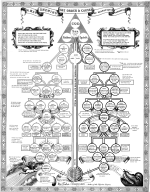I’m still waiting for some type of response to this simple question.
Is it a simple question, though? "Is the Gospel simple or complex?" is actually a false dichotomy. It depends on your point of view.
If you're trying to explain to sinners what the Gospel is, it might be something like:
Everyone has sinned, and their sins have angered the God who created them. Everyone deserves the death penalty. But Jesus Christ, the Son of God, died on a cross in your place. If you will turn away from your sins and have faith in Jesus's promises to save you, he will rescue you from the just punishment that you deserve.
(This is a bit off the cuff, so we could nitpick the exact wording, but a more theologically precise statement wouldn't be that much longer.)
That's pretty simple.
On the other hand, if we went into a detailed theological discussion of what biblical salvation means, just the topical outline alone is more complicated. Here's an example from John Bunyan:

That looks like about a year's worth of sermons, just on what "salvation" means. Because the Bible teaches that the Father, the Son, the Holy Spirit, and ourselves all contribute something to our salvation, and they all come in a particular logical order, and are affirmed in different parts of Scripture. A sermon series on salvation would be a systematic theology, and the Bible is not systematic.
Which one is true and biblical? Well, both of them. Which one is more expedient? That depends on what you're trying to convey.

